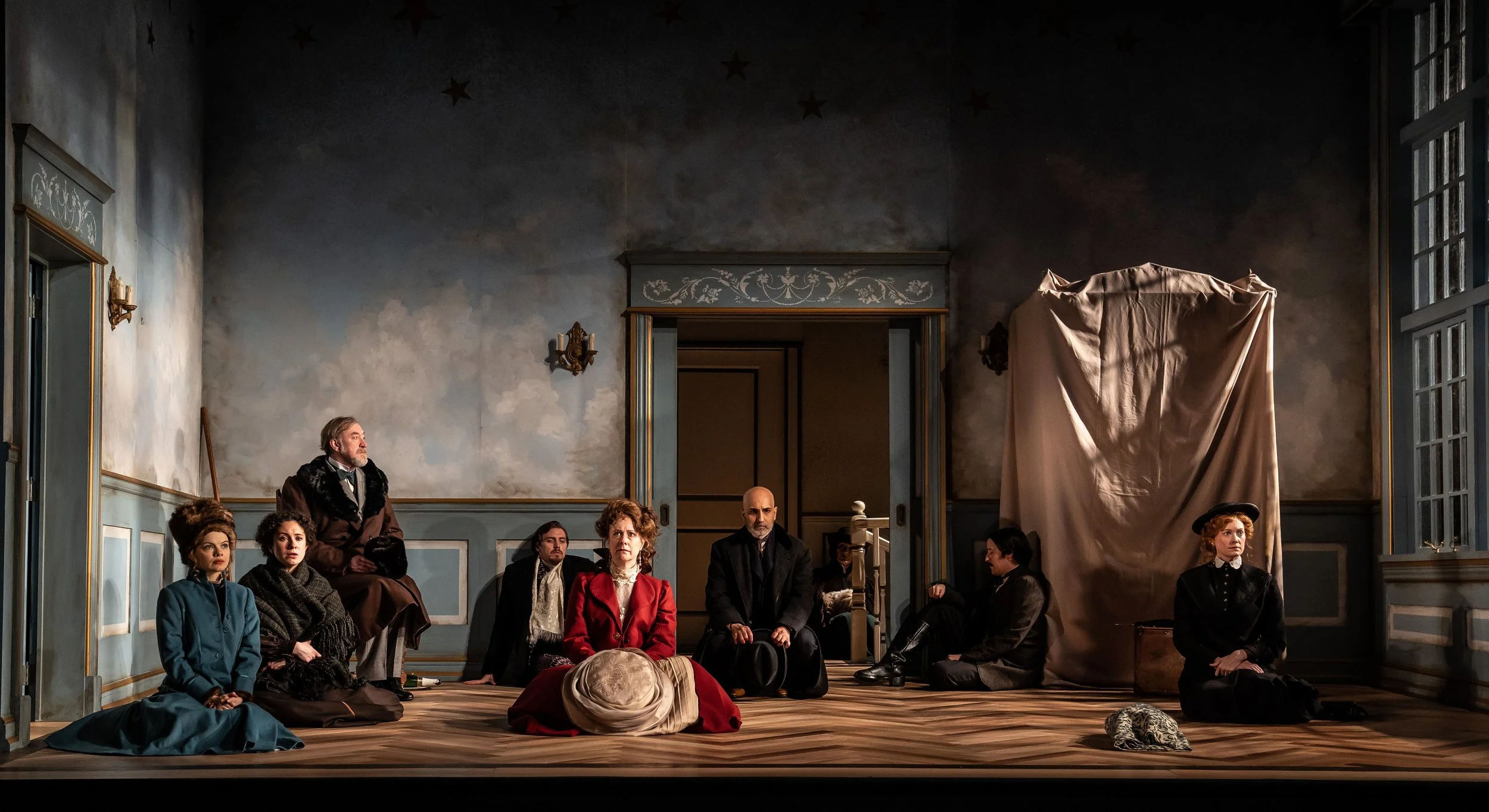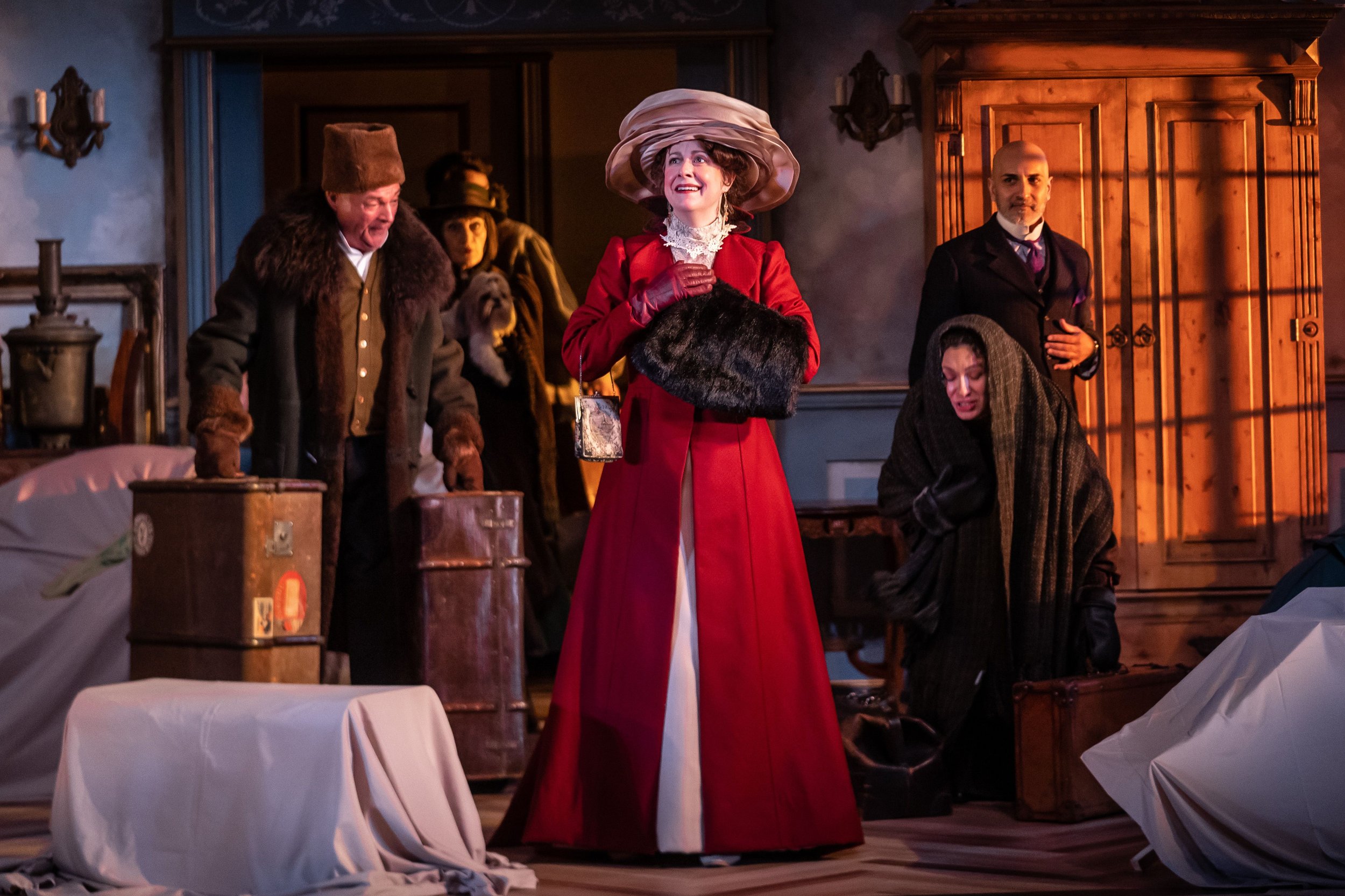The Cherry Orchard
The Cherry Orchard is the last play by Russian playwright Anton Chekhov. Chekhov's play, written in 1903, is mainly treated as a tragedy; however, he described it as a comedy with some elements of mockery, which is how Director Robert Falls portrays this incredible storyline. To my taste, I preferred to follow the tragic narrative, which slowly and majestically reveals a greater sense of the depressed significance in Russia during the painful societal issues within this play. The play revolves around Lyubov Ranevskaya, a Russian landowner returning from Paris to her family estate known for its beautiful cherry orchard. Lyubov was a kind-hearted profligate who continuously lived beyond her means and refused to believe she still wasn't one of the autocratic Russian royalty. Unfortunately, due to her frivolous habits, the ascending middle class, and the emancipation of serfs, Lyubov couldn't afford the estate's expenses without the servitude of serfs and refused to listen to Yermolai's absurd proposal to save the estate by renting cottages to gain the wealth needed to pay the mortgage. And when he mentioned that she would have to cut down the famous Cherry Orchard trees, she spurned him, and the estate is auctioned. And to add more irony, Lyubov learns that Yermolai, the son of a former serf, who has worked his way out of poverty, was the person that bought the land— with the family leaving tormented by the cutting down of the cherry orchard. Lyubov reflects on the guilt of having enslaved serfs working at the Orchard, confessing that "We have committed many sins, contributing those sins as one of the reasons why she is suffering the loss of her family's estate and her son's drowning." Her original line was, "Lord forgive my trespasses and let the punishment come to an end;" however, this production used a slightly less confessional tone to lessen this grievous moment. She receives letters from her second lover from Paris asking her forgiveness for leaving her for another woman and begging her to return.
Throughout the play, we witness each character's life's social mobility and collapse, bringing home Chekhov's laments ironically disguised with trivial conversations. In addition, the story presents themes of cultural failures, as both of Russia's aristocracies fail to maintain their wealthy social status through the ownership of serfs and the loss of the new society of free peasants failing to combine their new-found materialism with their anti-materialist upbringing. The cast was outstanding, with too many great performances to single out. However, without including their long Russian names, Kareem Bandealy, Christopher Donahue, Alejandra Escalante, Matt Decaro, and Will Allen were notable in their performances. But this production of The Cherry Orchard had some of Chicagoland's elite theater performers on stage. Kate Fry, who places Lyubov Ranvevskaya, makes any role she plays magnificent, and equally marvelous is Janet Ulrich Brooks (Charlotta). I haven't seen a play where these two stellar Chicago actors haven't performed at immaculate levels. And then you have the Steppenwolf Theatre Company ensemble member Frances Guinan as Firs— another powerhouse actor in Chicago theater. With all this talent on stage, they could be doing a play about eating pizza, which would be a hit!
According to the storyline within Chekhov's play, the most powerful performance to me is Petya Trofimov, played by Stephen Cefalu Jr. Petya, a dynamic reformist political opinionist has the passion Chekhov wanted us to envision when speaking about the evils of humanity. The audience laughed at the humor in this production but seemed to glance over its powerful and passionate saga of tragedy and pain. I enjoyed Petya's revolutionary stands for a better Russia and his views on the ignorance we live in when it comes to the struggles of others. Chekhov's grandfather, a former serf, passionately and idyllically share all the peasant's dream of working together to achieve a better life, which only those with the toils of life could understand. Through Petya, Chekhov symbolizes The Cherry Orchard with all of Russia—the beauty within its cities and the painful past of the autocracies, owing serfs. His horrifying description of each Cherry Orchard tree as a serf was haunting, but with his optimism (Go, Free as Air), he offers us a ray of hope in humanity through the youthful eyes of Anya. Chekhov's positive negativity is indeed oxymoronic, but his feelings of humanity are actually how we all feel today.
“What we have achieved is widespread misery, bourgeois, vulgarity, and moral barbarism.”
Chekhov's writing is magnificent, touching on our perpetual need to deceive ourselves of the truth and the anguish we place on others. Overall, this play symbolizes life's futility, asking, "What does men have to be proud of?" I like how By Dr. Oliver Tearle (Loughborough University) described Chekhov's The Cherry Orchard as an elegy for an old Russia that was in the process of dying at the turn of the century, with the new Russia powerless to be born. His words sum up Chekhov's humorous and haunting human emotions we concealed behind closed doors.
Let's Play Theatrical Review Highly Recommends The Cherry Orchard at Goodman Theatre.
Goodman Theatre
The Cherry Orchard
Written by Anton Chekhov
Directed by Robert Falls
Extended to May 7, 2023

